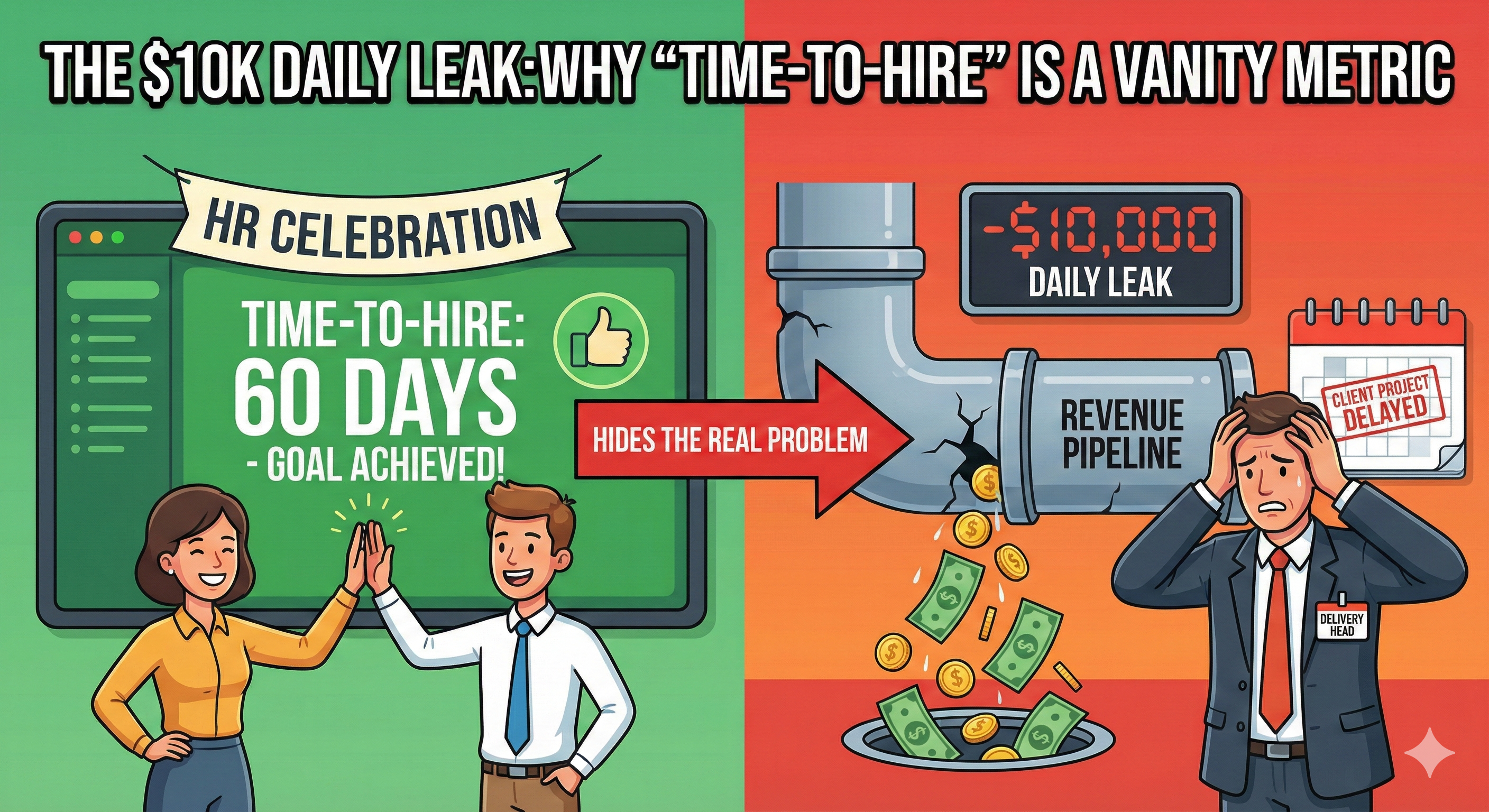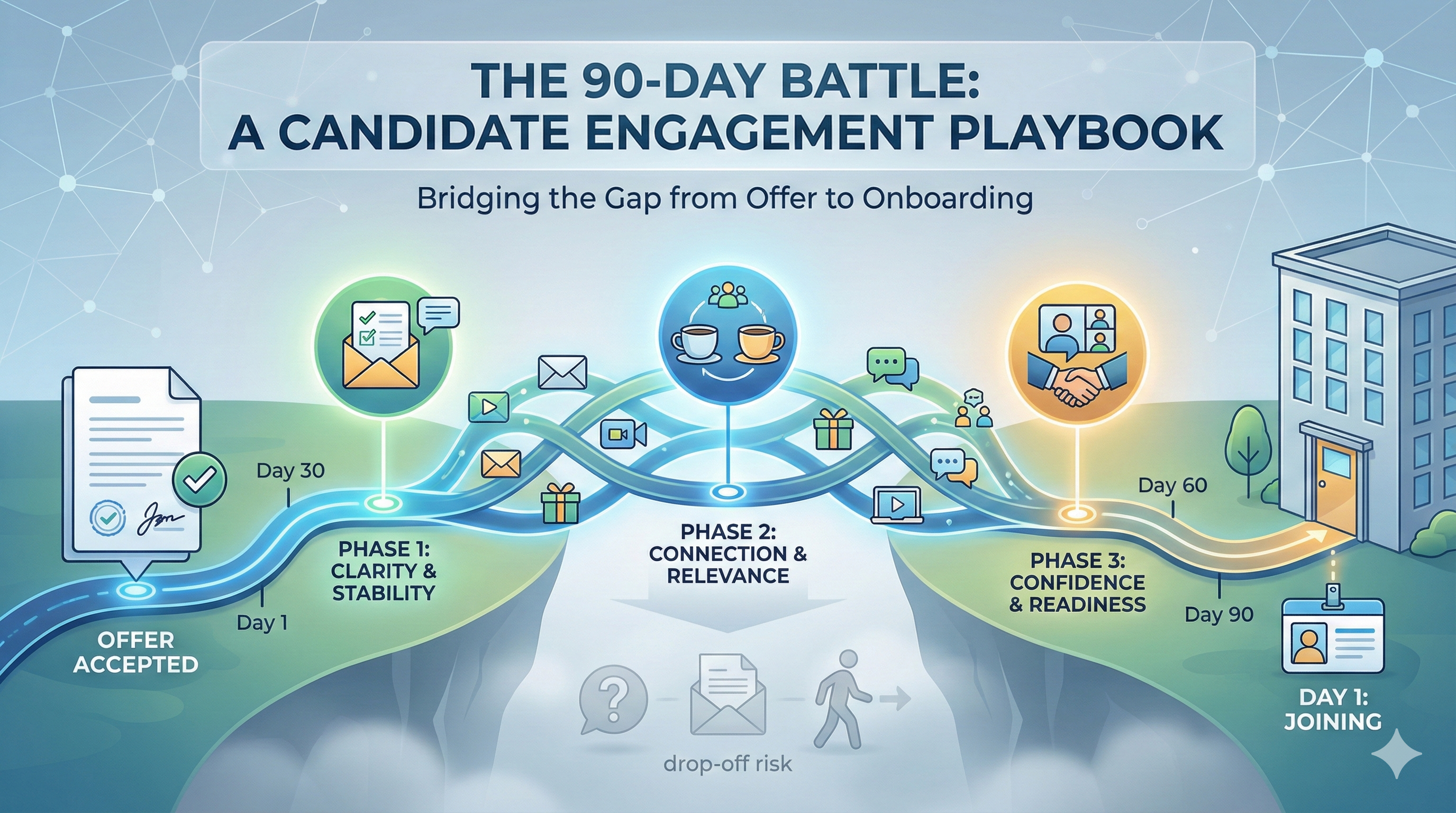Table of content
Building Your Employer Brand Across Tier 2 and Tier 3 Campuses
The fight for talent is no longer just in tier 1. Students in smaller cities are ambitious, digital-first, and open to opportunities beyond the big metros. That’s why more and more companies are now flocking to tier 2 and 3 campuses.
The competition is stiff, but of these colleges still don’t see the big-name brands show up consistently. This gives you a real chance to stand out. The way to do it is through a strong employer brand that signals opportunity, trust, and growth. In this guide, we’ll explore why employer branding in these campuses matters, and how to create a presence that actually gets students to choose you.
What is an employer brand?
When people hear the word “brand,” they often think of logos, ads, or company taglines. But your employer brand is something different. It’s the impression people have about what it feels like to work at your company. It answers questions like: Would I be valued here? Will I grow? Do people enjoy working there?
Just like students choose colleges based not only on academics but also on campus culture, friendships, and stories they’ve heard, job seekers choose companies based on the overall picture they have of life inside the workplace.
Employer branding is how you shape that picture.
On Tier 2 and Tier 3 campuses, it can be as simple as showing real employee stories. For example, if a graduate from a smaller town joined your company and grew into a leadership role, sharing that journey during campus talks makes students see what’s possible for them too. Or making your presence felt beyond placement day. Instead of only showing up once a year, you could run workshops, hackathons, or mentorship sessions. That shows students you’re invested in their growth, not just in filling positions.
Your employer brand isn’t what you say about yourself. It’s what students experience and remember after every interaction with you. On smaller campuses, where students don’t see Fortune 500 companies every day, even small, genuine efforts stand out and can make you the most attractive choice.
5 Ideas to build your employer brand on tier 2 and tier 3 campuses
Your employer brand on smaller campuses doesn’t grow just because you show up for placements. It’s built through every interaction, from the way you talk about roles to the way students feel after meeting your team. Here are five ways to do it.
1. Bring your young employees to campus
Students often struggle to connect with senior leaders who are decades ahead in their careers. But when they hear from someone who was sitting in the same classroom just a few years ago, the impact is very different.
For example, a recent hire from a Tier 2 campus sharing how they grew into a team lead in two years can inspire more trust than a polished corporate slide deck. It shows that students from smaller towns can thrive in your company.
- Real employee stories feel authentic
They create role models students can relate to - They signal that your company values fresh talent
Instead of relying on presentations alone, let these stories speak. They humanize your employer brand.
2. Run learning sessions that add value beyond jobs
Most companies limit campus engagement to the recruitment season. If you’re present earlier, offering something useful, students will remember you differently.
You could host:
- A coding workshop for tech students
- A personal finance basics session
- A mock interview clinic with live feedback
These sessions benefit students whether or not they join you. And that’s the point. By adding value beyond placements, you position yourself as a partner in their growth, not just another recruiter.
Students will talk about the company that taught them something practical. That word-of-mouth spreads across the campus, strengthening your brand before hiring even begins.
3. Partner with colleges on projects or hackathons
Tier 2 and Tier 3 campuses often lack opportunities to work on real-world problems. That’s your chance to step in.
Organize a hackathon, business case competition, or live project where students solve actual challenges your company is facing. It makes your brand visible in a very hands-on way.
Think about the impact:
- Students get exposure to industry problems
- You spot potential hires earlier in the pipeline
- Winners carry the pride of being associated with your brand
These activities also keep your brand alive on campus throughout the year. When placement season comes around, students already feel a connection to your company. That’s far stronger than a one-time presentation.
4. Show transparency about roles and career paths
One thing students often complain about is not knowing what the job really involves. They’re told about salaries and perks, but not about the day-to-day work or growth trajectory.
If you’re open about this, it builds trust quickly. Share details like:
- What the first six months in the role usually look like
The kind of projects they’ll handle early on
How performance is reviewed and rewarded
This kind of clarity removes doubts. It also prevents mismatched expectations later, which reduces dropouts or reneges.
You can take it a step further by bringing in managers or current employees to answer questions directly. A candid Q&A often does more for your employer brand than any marketing brochure.
5. Keep communication warm and consistent
Employer branding isn’t built only through events. It’s shaped by how you communicate at every stage.
A poor experience—like waiting weeks for feedback—can damage your image. But small, consistent actions can flip the script.
- A thank-you email after a campus visit
- Quick updates about interview results
- Sharing clear timelines for next steps
In Tier 2 and Tier 3 colleges, where students may feel overlooked by big brands, even these small gestures create a sense of being valued. And when candidates feel respected, they’re more likely to accept and stick with your offer.
Remember, consistency matters more than flash. Students remember how you made them feel, not just what you promised.
Together, these actions create a cycle: students see you as approachable, consistent, and genuinely invested in their future. That’s the essence of employer branding on smaller campuses—showing up not just to recruit, but to build relationships that last.
Let technology handle the heavy lifting so you can focus on your brand
Building an employer brand on smaller campuses isn’t only about what you say—it’s about what students experience at every step. And those experiences often get diluted when your teams are buried under logistics: chasing feedback, scheduling interviews, sending updates, or managing endless spreadsheets.
That’s where recruitment technology can take over the repetitive work and give recruiters the time to actually show up on campus and build relationships. RippleHire’s AI-powered ATS helps enterprises:
- Automate the basics: from resume screening to bulk candidate movement, so your team isn’t stuck in paperwork.
- Keep communication consistent: instant updates and touchless offers mean students never feel ignored.
- Make interviews smoother: smart scheduling and feedback capture ensure panels stay aligned and candidates get timely responses.
Predict and prevent drop-offs: AI signals show which candidates may be at risk, giving you time to re-engage before it’s too late.
When tech takes care of speed, compliance, and data accuracy, your recruiters and hiring managers can focus on the part that truly shapes your employer brand—engaging students with honesty, energy, and presence.
Book a demo today and see how we can help you hire faster, smarter, and with a stronger brand presence on every campus.
FAQs
What does employer branding mean on Tier 2 and Tier 3 campuses?
It’s the impression students form about what it feels like to work at your company. On smaller campuses, branding isn’t about big logos or flashy presentations. It’s about how approachable you seem, whether students can see real career growth, and how consistent your engagement feels throughout the year.
Why should companies invest in smaller campuses?
Students in Tier 2 and Tier 3 colleges are ambitious, digital-savvy, and open to opportunities. Since big brands don’t always show up consistently, these campuses give you a chance to stand out. With the right presence, you can attract high-quality talent while building loyalty that larger competitors may overlook.
How can storytelling help build an employer brand?
Real employee stories are powerful. When a young professional from a smaller town shares how they grew into a leadership role, students immediately connect. It feels authentic, relatable, and far more inspiring than a polished corporate deck. Stories humanize your brand and show students what’s truly possible in your company.
What kind of activities build trust on campus?
Workshops, hackathons, and live projects show that you care about student growth beyond placements. A coding clinic, a personal finance workshop, or a business challenge gives students value even if they don’t join you. This positions your brand as a genuine partner in their development, not just a recruiter.
How does transparency strengthen employer branding?
Students value clarity about roles, pay structures, and career paths. When you openly share what the first six months look like, the type of projects they’ll handle, and how performance is measured, it removes doubts. Transparency builds trust, reduces dropouts, and sets you apart from companies that stay vague.
What small gestures can improve candidate experience?
Simple actions matter—like sending a thank-you note after a campus visit, giving quick updates on interview outcomes, or sharing clear timelines. On campuses where students often feel overlooked, these gestures make them feel valued. Candidates who feel respected are far more likely to accept and stay with your offer.
















